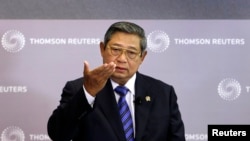A former Indonesian president on Friday accused the United States and Australia of lacking transparency over President Barack Obama's decision five years ago to rotate U.S. Marines through the Australian city of Darwin as part of the U.S. pivot to Asia.
Obama announced during a visit to Australia in 2011 that he would send military aircraft and up to 2,500 Marines to northern Australia for a training hub to help allies and protect American interests across Asia.
Susilo Bambang Yudhoyono, who was Indonesia's president at the time, told a security conference in the Australian capital Canberra on Friday that he first heard about the decision from a journalist days earlier while attending a summit of Asia-Pacific leaders in Hawaii.
“It was a surprise to me. Eventually things cleared up, but communication is important to avoid misunderstanding and build confidence and trust,” Yudhoyono said.
Both Obama and the then Australian Prime Minister Julia Gillard attended the same APEC summit.
Yudhoyono, who led Australia's second-nearest neighbor for a decade ending in 2014, said it was important for countries in the Asia-Pacific region to maintain strategic transparency.
“In any situation where Australia or her allies decide to deploy larger forces, especially in the northern part of Australia, with weapons systems and equipment, it is critical to communicate with Indonesia and other countries,” he said.
Yudhoyono, who was an army general before entering politics, said he was worried that a military build-up by China and other countries in the region had been coupled with a “reduction of strategic trust” among governments.
Countries with competing territorial claims in the South China Sea need to “refrain from provocative acts” and to constantly reaffirm their commitment to a peaceful solution through consultation, he said.
He said strategic unknowns facing the region's future include the outcome of the U.S. presidential elections which he described as “arguably the most consequential elections, in terms of impact on international affairs.”




